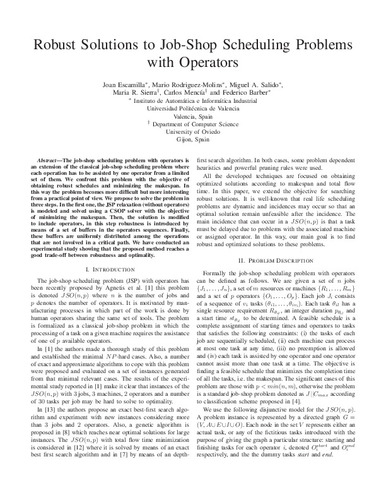Robust solutions to job-shop scheduling problems with operators
Fecha de publicación:
Editorial:
IEEE
Versión del editor:
Descripción física:
Resumen:
The job-shop scheduling problem with operators is an extension of the classical job-shop scheduling problem where each operation has to be assisted by one operator from a limited set of them. We confront this problem with the objective of obtaining robust schedules and minimizing the make span. In this way the problem becomes more difficult but more interesting from a practical point of view. We propose to solve the problem in three steps. In the first one, the JSP relaxation (without operators) is modeled and solved using a CSOP solver with the objective of minimizing the make span. Then, the solution is modified to include operators, in this step robustness is introduced by means of a set of buffers in the operators sequences. Finally, these buffers are uniformly distributed among the operations that are not involved in a critical path. We have conducted an experimental study showing that the proposed method reaches a good trade-off between robustness and optimality
The job-shop scheduling problem with operators is an extension of the classical job-shop scheduling problem where each operation has to be assisted by one operator from a limited set of them. We confront this problem with the objective of obtaining robust schedules and minimizing the make span. In this way the problem becomes more difficult but more interesting from a practical point of view. We propose to solve the problem in three steps. In the first one, the JSP relaxation (without operators) is modeled and solved using a CSOP solver with the objective of minimizing the make span. Then, the solution is modified to include operators, in this step robustness is introduced by means of a set of buffers in the operators sequences. Finally, these buffers are uniformly distributed among the operations that are not involved in a critical path. We have conducted an experimental study showing that the proposed method reaches a good trade-off between robustness and optimality
ISBN:
ISSN:
Identificador local:
20130481
Patrocinado por:
This research has been supported by the Spanish Government under research project MEC-FEDER TIN2010-20976- C02-01 and TIN2010-20976-C02-02, by the fellowship program FPU (AP2010-4405) and by the Principality of Asturias under grant FICYT-BP09105
Colecciones
- Capítulos de libros [6507]
- Informática [872]
Ficheros en el ítem




